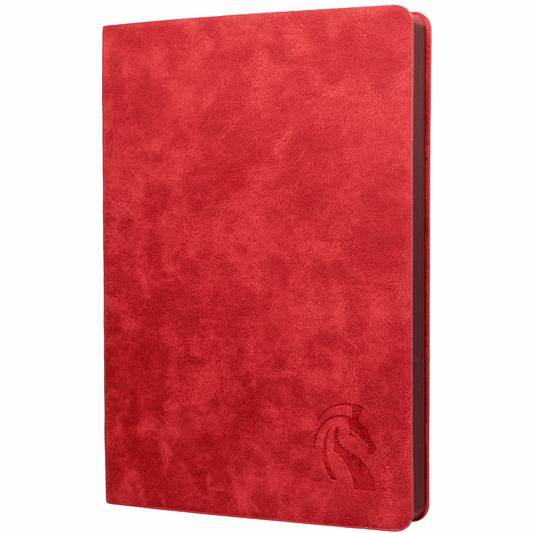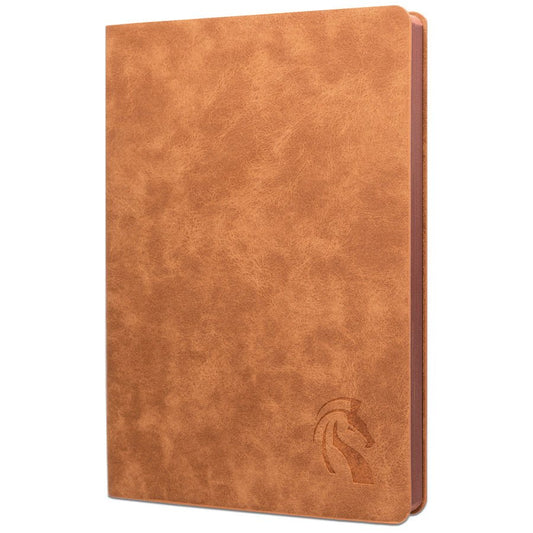
Welcome to a special collection designed just for those managing ADHD.
As you explore these 50 journal prompts, you’ll have the opportunity to reflect on both the challenges and triumphs that come with living with ADHD. These questions are here to help you discover new strategies, appreciate your unique strengths, and understand your experiences more deeply.
Let’s navigate the complexities of ADHD together, finding ways to adapt and thrive every day.
ADHD Daily Reflections
- What was one moment today when you felt really focused?
- How did you feel when you completed a task today?
- What’s something small that made you happy today?
- Write about a time today when you felt overwhelmed. What helped?
- List three things you accomplished today, no matter how small.
- How do you feel at the end of the day? What thoughts are on your mind?
- What’s one thing you could do tomorrow to make your day smoother?
- How do you organize your tasks to help with focus?
- What time of day do you feel most energetic?
- Describe a strategy that helped you overcome distraction today.

"Embrace your differences—they are what make you extraordinary."
Your ADHD Challenges
- What are the biggest challenges you face with ADHD?
- How do you explain your ADHD to others?
- Write about a time when your ADHD made a situation difficult.
- What misconceptions about ADHD bother you the most?
- How do you handle hyperfocus and switch tasks?
- What tasks do you find most difficult to start or complete?
- How does ADHD affect your relationships?
- What do you wish others understood about living with ADHD?
- Describe a moment when you felt misunderstood because of ADHD.
- How do you deal with frustration or setbacks?

"ADHD isn’t a deficit of attention, but a different way of thinking."
ADHD Management Strategies
- What tools or apps help you manage daily life?
- How do you prioritize what’s important when everything feels urgent?
- What routine helps you manage mornings or evenings better?
- Describe a technique that helps you calm down when you feel hyperactive.
- What’s the most helpful piece of advice you’ve received about managing ADHD?
- How do you break down big projects into manageable parts?
- What kind of physical activity helps you regulate your energy?
- How do you remind yourself to take breaks?
- What’s a new strategy you’d like to try for managing your ADHD?
- How do you track your progress or setbacks?

"Small steps every day lead to big changes over time."
ADHD and Personal Growth
- In what ways has ADHD contributed positively to your personality?
- What unique skills do you think you have developed because of your ADHD?
- How has ADHD helped you become more creative or resourceful?
- Write about a personal achievement that makes you proud.
- How do you use your strengths to your advantage?
- What’s something you love doing where you forget you have ADHD?
- How do you celebrate your successes?
- What personal growth have you noticed this year?
- How does living with ADHD make you unique?
- What goals do you have for yourself next year?

"Never underestimate your ability to adapt and overcome."
Mindfulness and ADHD
- Practice mindfulness: what do you hear, see, and feel right now?
- How does mindfulness or meditation help you with ADHD?
- Write about a peaceful place where you like to relax and clear your mind.
- What mindfulness exercises seem most effective for you?
- How do you stay present during conversations?
- Describe how you feel after a mindfulness session.
- What are some quick mindfulness techniques you use during hectic days?
- How do you bring yourself back to focus when your mind wanders?
- What’s the longest you’ve practiced mindfulness? How did it go?
- How can you incorporate more mindfulness into your daily routine?

Great job on working through these journal prompts!
By reflecting on your experiences and strategies, you're not only becoming more aware of your ADHD but also learning how to manage it more effectively. Remember, each day is a new chance to grow and learn more about yourself. Keep exploring what works best for you and celebrate every victory, no matter how small.
Here’s to continued success and self-discovery on your journey with ADHD.
Attention Deficit Hyperactivity Disorder (ADHD) affects millions of individuals worldwide, often making daily tasks feel overwhelming. Whether you’re navigating ADHD in adulthood or learning to manage ADHD symptoms for the first time, the challenges can feel all-consuming. This comprehensive guide will explore how journaling, strategies, and tools like the Pomodoro technique can aid in managing ADHD. We'll also delve into emotional regulation, time management, and the power of personal growth for overall well-being.
Understanding ADHD and Its Impact on Daily Life
ADHD is a neurodevelopmental disorder that affects attention, focus, impulsivity, and hyperactivity. Many individuals with ADHD experience difficulties in managing time, regulating emotions, and staying organized. ADHD symptoms can vary, but common experiences include:
- Intrusive thoughts that disrupt focus
- Difficulty maintaining attention on tasks
- Problems with time management and organization
- Hyperactivity and impulsivity
- Challenges with emotional regulation
For those living with ADHD, simple tasks like managing a daily routine or achieving long-term goals can feel insurmountable without the right strategies.
The Benefits of Journaling for Individuals with ADHD
Journaling is a powerful tool for managing ADHD. Writing down thoughts, feelings, and experiences allows individuals to gain valuable insights into their emotional well-being and personal growth. Regular journaling helps improve self-awareness, track progress, and even promote emotional healing.
When combined with structured tools like journal prompts, journaling can become a habit that supports mental health and emotional regulation. By integrating journaling into your daily routine, you create a space to reflect on ADHD challenges and celebrate small wins.
ADHD Journal Prompts for Self-Awareness and Growth
To make journaling a practical part of your ADHD management, consider using specific ADHD journal prompts. These prompts provide a structured outlet for exploring emotions, thoughts, and experiences. A few minutes of writing each day can help you regulate emotions, reduce negative self-talk, and work toward achievable goals. Here are some ADHD journaling prompts to try:
- What thoughts have been taking up space in my mind today?
- How can I use my unique strengths to tackle today’s challenges?
- What emotions have I been struggling with, and why?
- What is one small task I can focus on completing today?
Using these journal prompts helps you manage ADHD more effectively and turn thoughts into actionable strategies.
Time Management and ADHD: Strategies for Success
Managing time is one of the most common challenges faced by people with ADHD. Individuals often struggle with keeping up with tasks, meeting deadlines, or even remembering to take breaks. To combat this, a structured approach to time management is essential. One strategy that has proven helpful is the Pomodoro technique. This method involves breaking tasks into 25-minute intervals with short breaks in between. By focusing on one thing at a time, individuals with ADHD can improve executive function and avoid the overwhelm caused by multitasking.
Incorporating tools like timers, planners, and digital journaling apps can also support effective time management. Journaling about your daily routine can help identify patterns that work and those that need improvement.
Managing ADHD Through Emotional Regulation
Emotional regulation is another area where individuals with ADHD often struggle. The inability to control strong emotions can lead to impulsive decisions, outbursts, or difficulty managing relationships. ADHD in adulthood often includes managing rejection sensitivity, which can cause extreme emotional reactions to criticism or perceived slights.
One valuable tool for managing emotions is expressive writing. By using journaling to explore feelings of rejection, frustration, or anxiety, individuals can work through these emotions constructively. Writing in a notebook or using bullet journaling techniques can offer a structured outlet for exploring complex emotions.
Developing Healthy Habits with ADHD
People with ADHD often find it challenging to maintain healthy habits due to their symptoms. Habits like regular exercise, adequate sleep, and mindfulness practices can positively impact overall well-being, but they require consistency, which ADHD brains may resist. Incorporating journaling practice into your routine can help track progress and hold yourself accountable.
Building a journaling habit can also help with emotional well-being by offering a space to reflect on daily experiences. If you’re struggling to start, consider these tips:
- Write for just a few minutes each day
- Focus on small, achievable goals
- Use visual elements like doodles or color-coding to make your journal more engaging
- Incorporate gratitude to foster positivity
ADHD Management Tools and Techniques
Effective ADHD management involves using the right tools and techniques. Journaling is a powerful tool for tracking progress and recognizing growth, but additional strategies may be needed to support different aspects of life. Here are a few that can make a difference:
- Cognitive-behavioral therapy (CBT): This approach helps individuals challenge negative thought patterns and develop coping mechanisms.
- Mindfulness and meditation: These practices can help calm an overactive mind and improve focus.
- Sleep hygiene: Managing ADHD symptoms like hyperactivity and impulsivity can be easier with adequate rest.
Creating an ADHD-Friendly Daily Routine
Establishing a structured daily routine is crucial for managing ADHD. Routine offers predictability, helping individuals avoid overwhelm and procrastination. A few key tips for creating an ADHD-friendly routine include:
- Start the day with journaling to set intentions and goals
- Break tasks into smaller steps using techniques like the Pomodoro method
- Prioritize self-care and rest to avoid burnout
- Incorporate mindfulness exercises to stay grounded
Journaling about your routine can also help uncover patterns that lead to success or challenges. Regular journaling will provide insights into where changes need to be made.
ADHD, Executive Functions, and Task Management
ADHD affects executive functions, which are the mental processes that help you plan, focus, and complete tasks. Task management can be particularly hard for individuals with ADHD, as they may have difficulty breaking tasks into manageable steps or maintaining focus on long-term goals.
Bullet journaling or other visual organization tools can be an effective way to manage tasks. By using visual elements like checklists and timelines, individuals can enhance their task management skills. Journaling can help you recognize your unique strengths, track your personal growth, and find new ways to overcome challenges.
Building Social Skills and Improving Emotional Well-being
ADHD can also impact social skills and relationships. Individuals with ADHD may struggle with communication, reading social cues, or managing impulsive behaviors. Rejection sensitivity can further complicate social interactions, leading to heightened anxiety and stress.
Journaling is an excellent tool for reflecting on social experiences and exploring ways to improve communication. By regularly reflecting on social situations, you can identify areas for growth and practice emotional regulation.
ADHD and Mental Health: Navigating Anxiety and Stress
Living with ADHD often comes with coexisting conditions such as anxiety and depression. Journaling offers a space for expressive writing, which can be therapeutic for processing emotions. Journaling prompts focused on mental health can help you navigate feelings of overwhelm, stress, and anxiety.
Some helpful journal prompts for managing anxiety with ADHD include:
- What are my biggest sources of stress, and how can I reduce them?
- What techniques can I use to stay grounded during moments of overwhelm?
- What can I do to nurture my mental well-being today?
ADHD and Personal Growth: Fostering Resilience and Well-being
One of the most powerful aspects of journaling for individuals with ADHD is the opportunity for personal growth. Through consistent journaling practice, you can track your progress, acknowledge your successes, and work on areas of improvement. Resilience is a key trait for thriving with ADHD, and journaling can help foster this quality.
As you continue your ADHD journey, remember that living with ADHD means embracing your unique strengths and recognizing that progress is more important than perfection. Over time, journaling will become a valuable tool for self-awareness, emotional healing, and personal growth.
Conclusion
Living with ADHD presents many challenges, but with the right tools and strategies, you can manage symptoms, improve emotional well-being, and enhance your daily life. Journaling is a powerful, structured outlet that allows you to reflect on your ADHD journey and develop healthy habits that promote personal growth. Whether you’re using journal prompts, practicing mindfulness, or employing task management techniques like the Pomodoro method, incorporating journaling into your daily routine is a great way to improve your mental well-being and ADHD management.
By understanding ADHD’s impact on emotions, focus, and life management, you can begin to implement changes that support your unique needs, promote personal growth, and enhance your overall well-being.
ADHD Journal Prompts quoteFind inspiration for ADHD Journal Prompts here.
const keyword = 'ADHD Journal Prompts';
ADHD Journal Prompts Info
Details about ADHD Journal Prompts.- ADHD Journal Prompts
- Helpful tips

Top ADHD Journal Prompts
Best ADHD Journal Prompts
Effective ADHD Journal Prompts
Unique ADHD Journal Prompts
Helpful ADHD Journal Prompts
Simple ADHD Journal Prompts
ADHD Journal Prompts
Start your journey today
Italicized ADHD Journal Prompts Inserted ADHD Journal Prompts
Ctrl + J for ADHD Journal Prompts
Inserted ADHD Journal Prompts
Ctrl + J for ADHD Journal Prompts
- ADHD Journal Prompts Steps
Learn about ADHD Journal Prompts here.

Preformatted ADHD Journal Prompts
"ADHD Journal Prompts are amazing"ADHD Journal Prompts
| ADHD Journal Prompts Data |
- ADHD Journal Prompts List Item
Read Other Related Journal Prompts
50 Journal Prompts For Those Reflecting on November50 Journal Prompts For Those Celebrating Halloween
50 Journal Prompts For Those Exploring The Spiritual World
50 Journal Prompts For Those Reflecting on April














1 comment
Mental health is not a taboo, it’s okay to seek help. Always we should discuss on it and share experiences. I believe taking care of your mental health is an act of self-love. Thanks for the article and sharing so much information.